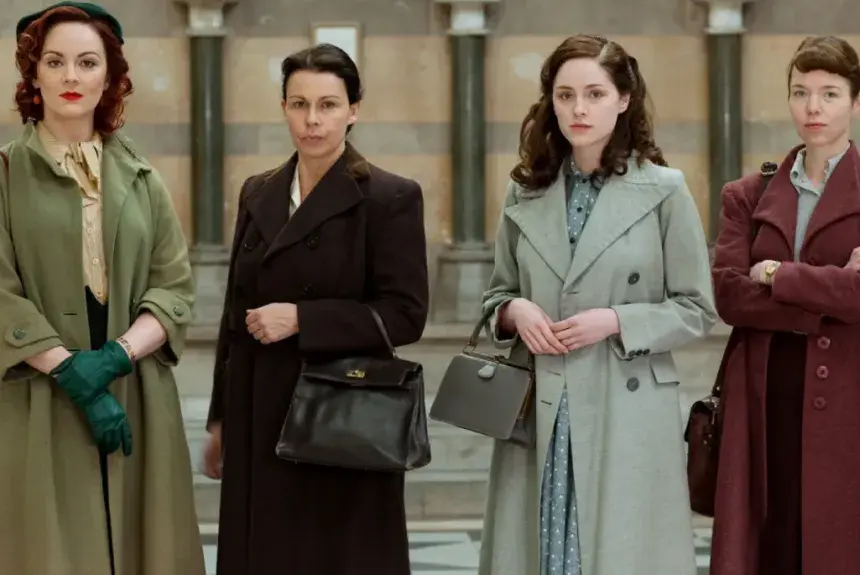
Juliet Floyd, Guy Burt et David Kenyon: "Bletchley Park and Popular Culture"
Presentations by: Juliet Floyd, Guy Burt, and David Kenyon
Discussants: Chon Tejedor and Piergiorgio Donatelli
Presentation Summaries:
Gender, Bletchley and Popular Culture (Juliet Floyd)
In Pursuits of Happiness Cavell emphasized the importance of women’s voices in certain Hollywood films of the 1930s, arguing that these popular “talkies” allowed their audiences to experience new possibilities for everyday life, and in particular, for the voices of women. Bletchley Park has inspired in our time further extensions of women’s voices in literature (The Rose Code) and TV Series (The Bletchley Circle). I will argue that The Bletchley Circle, with its exclusively female lead “superheroes”, its dramatization of women’s lives, and its extension into TransAtlantic post-war American life -- including the gay rights movement, the Cold War, the secret state and McCarthyism, feminism, jazz, and racial relations in San Francisco in the 1950s and 1960s – constitutes a further extension of what Cavell observed, allowing us to critically address moral and everyday problems of our time through a melding and re-lensing of the genres of history and historical fiction, contemporary gender criticism, spy dramas, detective and police shows, exploiting the power of ordinary life and ordinary language for ethics and moral reflection.
Women of The Bletchley Circle (Guy Burt)
Bletchley Park and the top-secret codebreaking that went on within it were instrumental in turning the tide of World War 2, and have exerted a compelling grip on the popular imagination ever since their activities were disclosed to the public. But while the work of Alan Turing has deservedly been the subject of substantial critical and creative focus, Bletchley also recruited scores of exceptional women whose skills were to prove as instrumental to the war effort as any division of troops on a battlefield. The difference was that while those men who returned home from the war did so with medals and to public acclaim, the women of Bletchley were expected to slip back into obscurity, keeping their war work secret even from their families, and reassume their conventional roles as housewives and mothers. I would like to talk about how my interest in these hidden heroes of the war became the starting-point for The Bletchley Circle, and also more discursively about the process of writing and developing the series.
Alan Turing and the Public imagination (David Kenyon)
Alan Turing is a figure whose worldwide profile continues to grow. He is widely known as one of the foremost cryptanalysts at Bletchley Park during WW2, and his subsequent prosecution for homosexual activity and premature death in 1954 have made him something of a folk hero, particularly among the LGBTQ+ community, and champions of neuro-diversity. His story was told in the 2014 feature film ‘The Imitation Game’ and he was recently chosen by the UK public to be depicted on the new £50 banknote. But is the Turing of popular culture a good representation of the man and his achievements? Arguably his contribution to mathematics, and the founding principles of computing and artificial intelligence are far more significant to the modern world that his brief period as a codebreaker. Had he lived a longer life, it is possible that Turing’s time at Bletchley Park would be only a footnote to a much more important career in computer science, and biology. This presentation compares the Turing of films, TV and popular culture, with the historical evidence for the ‘man behind the myth’.
Biographies:
Juliet Floyd is Professor of Philosophy at Boston University, researching 20th century analytic and American philosophy, philosophy of logic, mathematics, language, symbolism, aesthetics and new media. She has published two books on Wittgenstein’s philosophy of mathematics and over one hundred articles, recently editing the volumes Philosophy of Emerging Media (with James E. Katz, Oxford, 2016), Philosophical Explorations of the Legacy of Alan Turing (with A. Bokulich, Springer, 2017), Perceiving the Future Through New Communication Technologies (with James E. Katz and Katie Schiepers, Springer, 2021), and Stanley Cavell’s Must We Mean What We Say? at Fifty (with Greg Chase and Sandra Laugier, Cambridge, 2022).
Guy Burt is a novelist and BAFTA award-winning screenwriter. He wrote his first novel, After the Hole, when he was 18, and since then has published two more novels: Sophie and The Dandelion Clock. Since 1999, he has been working extensively in television drama, both as a writer and an Executive Producer and showrunner, on original series and adaptations for both adults and children.
David Kenyon is the Research Historian at Bletchley Park, the British WW2 code-breaking site now open as a museum. He is responsible for researching all aspects of the history of British Signals Intelligence in WW2, and supports all public content at Bletchley Park as well as being the media spokes-person for the site. His background is in 20th Century military history and archaeology, on which he has published several books, as well as teaching at UK universities and elsewhere. He is a Common-Room Member of Kellogg College Oxford.
Chon Tejedor has been Profesora de Filosofía at the University of Valencia, Spain, since 2017. Before then, she was Senior Lecturer in Philosophy at the University of Hertfordshire (2014–2017) and, for twelve years, Lecturer in Philosophy at the University of Oxford (2002–2014). Her research focuses on Wittgenstein’s treatment of language, ethics, science and metaphysics and she is currently developing a new strand of research on the ethics of conditioned responsibility. Her publications include The Early Wittgenstein on Metaphysics, Natural Science, Language and Value (Routledge, 2015) and Starting with Wittgenstein (Bloomsbury, 2011).
Piergiorgio Donatelli is Professor of Philosophy and Head of the Department of Philosophy at Sapienza Università di Roma. He has written on the history of ethics, contemporary moral theory, bioethics and on issues related to human life, as well as on J. S. Mill, Wittgenstein, Foucault, and Stanley Cavell.